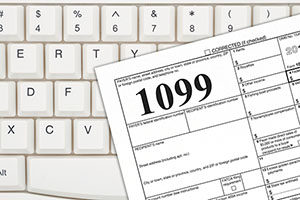Form 1099-MISC, Miscellaneous Income, Reporting
 Form 1099-MISC, Miscellaneous Income, Reporting
Form 1099-MISC, Miscellaneous Income, Reporting
New Filing Date
Form 1099-MISC is due to the IRS by January 31 of the following year when you are reporting non-employee compensation payments in box 7. Otherwise, file by February 28 if filing by paper, or March 31 if filing electronically. The due dates for furnishing payee statements remain thesame at January 31 of the following year.
Who Must File
File Form 1099-MISC, Miscellaneous Income, for each person to whom you have paid during the year:
• At least $10 in royalties or broker payments in lieu ofdividends or tax-exempt interest,
• At least $600 in:
– Rents,
– Services performed by someone who is not your employee (including parts and materials),
– Prizes and awards,
– Other income payments,
– Medical and health care payments,
– Crop insurance proceeds,
– Cash payments for fish (or other aquatic life) you purchase from anyone engaged in the trade or business of catching fish,
– Generally, the cash paid from a notional principal contract to an individual, partnership, or estate,
– Payments to an attorney. See Payments to Attorneys, later, or
– Any fishing boat proceeds.
In addition, use Form 1099-MISC to report that you made direct sales of at least $5,000 of consumer products to a buyer for resale anywhere other than a permanent retail establishment.
You must also file Form 1099-MISC for each person from whom you have withheld any federal income tax under the backup withholding rules regardless of the amount of the payment.
Trade or Business Reporting Only
Report on Form 1099-MISC only when payments are made in the course of your trade or business. Personal payments are not reportable. You are engaged in a trade or business if you operate for gain or profit. However, nonprofit organizations are considered to be engaged in a trade or business and are subject to these reporting requirements. Other organizations subject to these reporting requirements include trusts of qualified pension or profit-sharing plans of employers, certain organizations exempt from tax under section 501(c) or 501(d), farmers’ cooperatives that are exempt from tax under section 521, and widely held fixed investment trusts. Payments by federal, state, or local government agencies are also reportable.
Exceptions:
Some payments do not have to be reported on Form 1099-MISC, although they may be taxable to the recipient. Payments for which a Form 1099-MISC is not required include payments to a corporation (including a limited liability company (LLC) that is treated as a C or S corporation). But see Reportable Payments to Corporations, later.
Reportable Payments to Corporations
The following payments made to corporations generally must be reported on Form 1099-MISC.
• Medical and health care payments,
• Fish purchases for cash,
• Attorneys’ fees,
• Gross proceeds paid to an attorney,
• Substitute payments in lieu of dividends or tax-exempt interest, and
• Payments by a federal executive agency for services (vendors).
Payments to Attorneys
The term “attorney” includes a law firm or other provider of legal services. Attorneys’ fees of $600 or more paid in the course of your trade or business are reportable on box 7 of Form 1099-MISC.
Gross proceeds paid to attorneys.
Report in box 14 of Form 1099-MISC payments that:
• Are made to an attorney in the course of your tradeor business in connection with legal services, for example, as in a settlement agreement,
• Total $600 or more, and
• Are not reportable by you in box 7.
Payments to corporations for legal services.
The exemption from reporting payments made to corporations does not apply to payments for legal services. Therefore, you must report attorneys’ fees (in box 7) or gross proceeds (in box 14) as described earlier to corporations that provide legal services.
Penalties
Penalties for failure to file correct information returns and/or to furnish correct payee statements have increased and are now subject to inflationary adjustments. Information returns and payee statements include, for example, Forms 1098, 1099, W-2G and W-2.
The penalty rates and maximums for failure to file correct information returns and/or to furnish correct payee statements are as follows.
Small Businesses with Gross Receipts of $5 Million or Less
| Time Returns Filed/Furnished | Returns Due 1/1/18 Through 12/31/18 |
| Not more than 30 days late (by March 30 if the due date is February 28) | $50 per return/$187,500* maximum |
| 31 days late but by August 1 | $100 per return/$536,000* maximum |
| After August 1 or not at all | $260 per return/$1,072,500* maximum |
| Intentional disregard | $530* per return/no limitation |
| *Adjusted for inflation. |
Large Businesses with Gross Receipts of More Than $5 Million and Governmental Entities
| Time Returns Filed/Furnished | Returns Due 1/1/18 Through 12/31/18 |
| Not more than 30 days late (by March 30 if the due date is February 28) | $50 per return/$536,000* maximum |
| 31 days late but by August 1 | $100 per return/$1,609,000* maximum |
| After August 1 or not at all | $260 per return/$3,218,500* maximum |
| Intentional disregard | $530* per return/no limitation |
| *Adjusted for inflation. |
The amount of the penalty is based on when you file the correct information return or furnish the correct payee statement. A penalty for failure to file a correct information return is separate from the penalty for failure to furnish the correct payee statement. For example, if you fail to file a correct Form 1099-MISC with the IRS and don’t provide a correct Form 1099-MISC statement to the payee, you may be subject to two separate penalties. If you have any questions about your required 1099-MISC forms, please give us a call.
